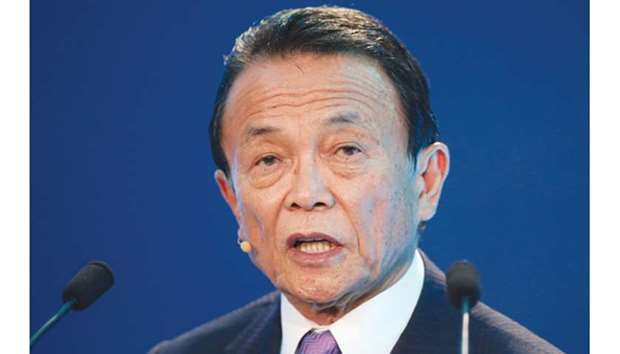Japan must adhere to the government’s goal to achieve a balanced budget by the fiscal year ending in March 2021, Finance Minister Taro Aso said, in a resolve to push for fiscal consolidation to fix the country’s tattered finances.
Aso made the pledge at a meeting of Prime Minister Shinzo Abe’s top economic advisory council, which yesterday discussed the government’s annual key economic and fiscal policy guidelines due around the end of June.
The guidelines will provide the basis for compiling the budget for the fiscal year starting April 2018. The council also approved an outline for its annual growth strategy, mostly a continuation of policies Abe introduced last year to narrow the wealth gap, improve working conditions and raise productivity.
“Achieving a primary budget surplus in fiscal 2020 is the least of our responsibilities for future generations. We are not allowed to take down the flag,” Aso said in a document submitted to the council.
The primary budget balance – excluding new bond sales and debt servicing – serves as a barometer of government efforts to balance spending with revenue.
The goal remains elusive.
The government’s calculations show a primary budget surplus won’t be met by end-March 2021 without further efforts to boost tax revenue and cut spending.
Given Japan’s huge public debt – more than twice the size of its economy – any signs the government is giving up on fiscal discipline could invite a bust in finances or runaway inflation that would deal a blow to the general public.
Aso urged the government, when compiling the fiscal 2018 budget, to keep a cap on bulging social security spending in a fast-ageing society, and called for more efforts to curb such outlay. The government faces a difficult balancing act trying to lower spending on medicine and healthcare without alienating older voters. It also wants to help low-income households with a free schooling programme and more vocational training.
Some economists are concerned overall finances will not improve if increased spending on some welfare programmes offsets cuts from other budget parts.
Fiscal consolidation should contribute to growth and boost revenue as it helps ease concerns about the future and stimulate consumer spending and business investment, Aso said yesterday.
He added that fiscal reform should strengthen Japan’s fragile fiscal structure and win the trust of the international community.

Aso: Fiscal reform should strengthen Japan’s fragile fiscal structure and win the trust of the international community.
